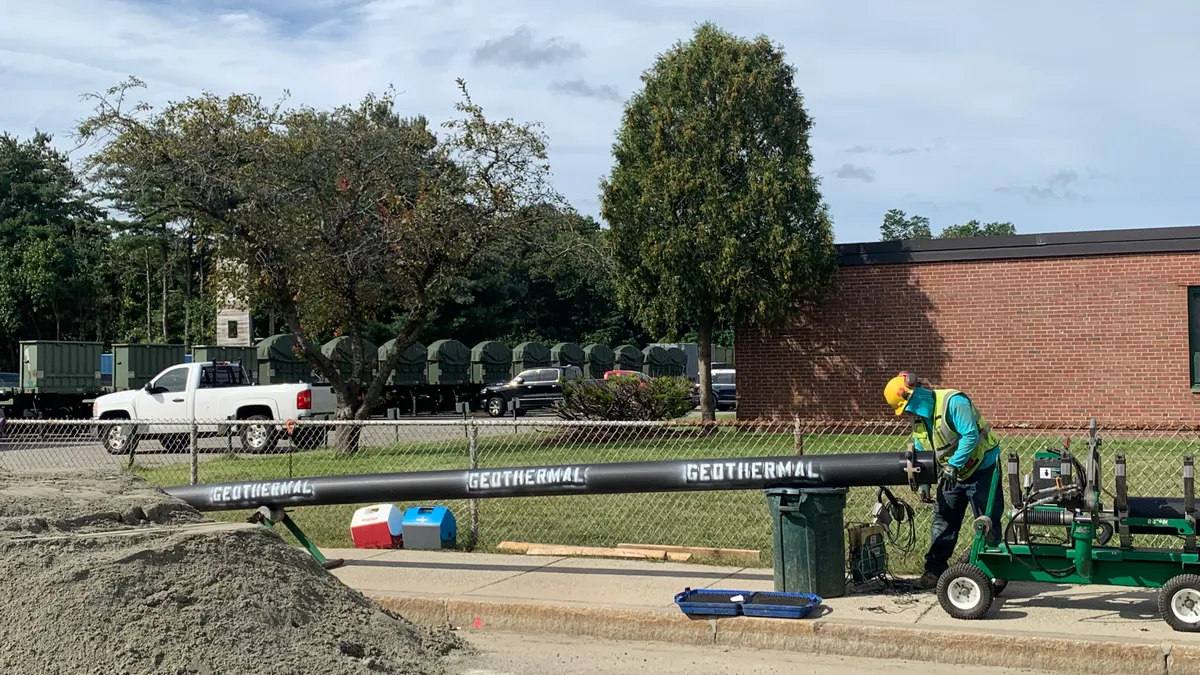Dive Brief:
- The nation’s first networked geothermal system owned by a utility went live June 4 in Framingham, Massachusetts.
- The roughly $15 million network of ground-source heat pumps will cool and heat 36 buildings without fossil fuels, says Eversource Energy, the utility leading the project.
- As decision-makers nationwide eye networked geothermal as a technology with the potential to decarbonize entire neighborhoods, the two-year Framingham pilot aims to offer lessons for other communities.
Dive Insight:
Networked geothermal systems rely on the consistent underground temperatures of around 55 degrees Fahrenheit. Buried pipes allow heat to be transferred into homes in the winter and out of homes in the summer, or between buildings when one has excess heat that another could use.
A data center where machines are generating large amounts of heat, for example, could give that energy to nearby homes rather than releasing it into the atmosphere, explained Ania Camargo, thermal energy networks senior manager at the Building Decarbonization Coalition.
“It is the most efficient way to heat and cool buildings that we know of,” she said, avoiding the need to build out as much electrical infrastructure to get buildings off fossil fuels. Networked geothermal also offers an “evolutionary path” forward for the gas companies and workers who could otherwise be out of a job in a renewable energy future, Camargo said.
Already, some college campuses and developments owned by a single entity use networked geothermal systems, Camargo said. Utilities have been slower to get into the game because they are highly regulated, she said. “Gas utilities are only allowed to sell gas,” she said.
That’s slowly changing in some places. Six states have passed legislation that either allows or mandates that utilities pilot thermal energy networks, and six more states have filed such legislation, Camargo said.
Nine pilots in New York are in the engineering phase; in Massachusetts, four pilots proposed by utility National Grid have been approved and one is under construction. Plus, two utilities in Minnesota proposed networked geothermal district energy systems in their five-year innovation plans.
The U.S. Department of Energy threw some financial support behind community-scale geothermal projects last year, awarding 11 communities a total of $13 million to design systems.
The heat pumps used in these systems “are the most underutilized tool right now in terms of the potential to decarbonize our building and community infrastructure,” Alexis McKittrick, a program manager in DOE’s Geothermal Technologies Office, told Smart Cities Dive at the time of the DOE awards.
In Framingham, work to convert customers to the geothermal system will continue throughout the summer, according to an Eversource press release. Data collection begins in July.
Eversource paid for the construction of the system and the new equipment for homes and businesses. Customers will pay a monthly fixed charge to use the system — about $10 for residential customers and $7 for income-qualified customers, said Eversource Media Relations Manager William Hinkle in an email. Commercial customers will pay $21 monthly. Customers will also pay for the electricity that powers their heat pumps, but Eversource expects they will end up paying less for energy each month because they won’t be paying as much for gas or delivered fuels. Customers that rely on gas for cooking or hot water appliances will still do so, Hinkle said.
The question everyone is asking right now is how to fund these projects, Camargo said. “When you're doing the first [project of its kind], it's going to be really expensive because everybody's working it out,” she said. But utilities have long spread the cost of expensive infrastructure across customers for decades. The harder part is figuring out how to pay for retrofits inside people's homes, Camargo said, noting that the Inflation Reduction Act and other state programs can help.
Cities interested in pursuing networked geothermal can consider using the systems for groups of municipal buildings, a strategy Rochester, Minnesota, is pursuing. Cities can also ask their utilities to pursue the technology and can advocate for state-level legislation to allow utilities to do so, Camargo said.
“The utility companies are going to be much more excited to work with the town who wants this and who is educated about it,” she said.












